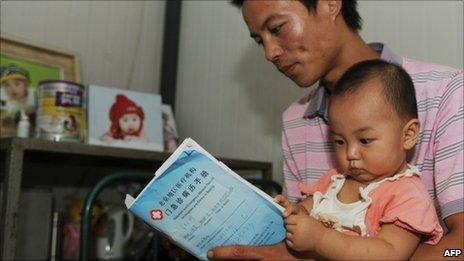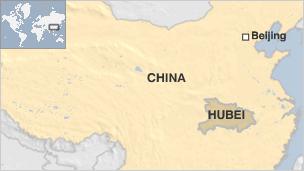China examines milk powder 'premature puberty' reports
- Published

Beijing parent Wang Gang recently discovered his 13-month-old daughter had been diagnosed with premature breast growth, China Daily reports
China's government is investigating reports that a brand of powdered milk caused infant girls to grow breasts.
It is being alleged that hormone-tainted milk from Synutra International caused several cases of premature puberty in Hubei province.
The Chinese firm, whose shares fell by up to 35% on the news, strongly denies its products were tainted.
Food safety problems involving milk powder and other products have alarmed Chinese consumers in recent years.
Two years ago, the chemical compound melamine was found in milk products made by 22 Chinese firms. Hundreds of thousands of children were poisoned and six died.
Powder samples
A panel of nine experts on endocrine, paediatric and food safety issues had been assembled to investigate the tainted milk allegations, the health ministry announced on Thursday.

The ministry was "directly investigating the claimed premature puberty cases at the request of Hubei province" and would publish its conclusions "soon", it said.
Samples taken from the market where the milk powder was purchased, as well as from the homes of the infant girls, were already being tested, it added.
China Daily, the country's leading state-owned English-language newspaper, reported the cases in Hubei this week, external, quoting from a report by the Beijing-based Health Times newspaper.
At least three infants in Hubei were found to have abnormal levels of the hormones estradiol and prolactin, which stimulates the production of breast milk, Health Times reported.
The infants' parents feared that their conditions were linked to their milk powder, produced by Synutra, and a leading children's doctor in the region was quoted by Health Times as calling for the powder to be analysed.
On Tuesday, the father of a 13-month-old girl in Beijing told China Daily his daughter had been diagnosed with symptoms of premature puberty.
Wang Gang was quoted by the paper as saying he was "furious at Synutra".
'Unwavering product quality'
The chairman of Synutra, Liang Zhang, has said that there is "no scientific evidence" to support the allegation that Synutra products were responsible for the cases.
"While we offer our sympathy to any families experiencing health challenges, we firmly believe that our products are not involved in the claims recently made, and we feel this media event will pass," he said in a statement, external.
"We firmly believe they will illustrate our unwavering product quality and commitment to consumer safety."
A food safety expert for the World Health Organization, Dr Peter Ben Embarek, said China's test results were expected within days and that the agency would then examine them.
"At first look, it looks very surprising," he told the Associated Press, adding that this was the first time he had ever heard of such a case.
- Published9 July 2010